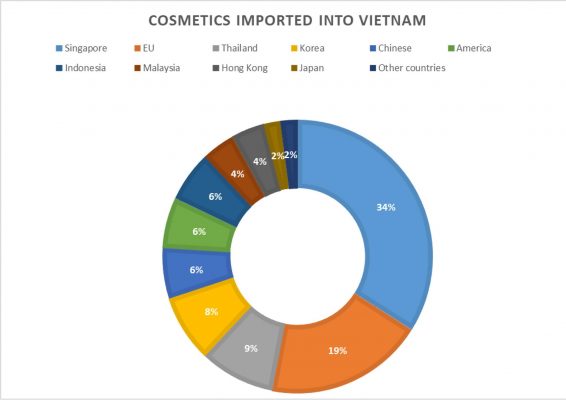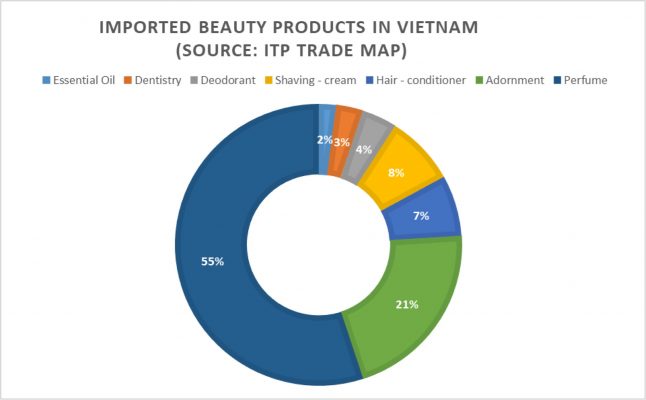December 2018 – Vietnam has a GDP of $220 billion and population of 92 million, around 60% is below the age of 35. It is expected to have 33 million middle-income earners by 2020, based on the facts that Vietnam’s GDP will grow by more than 6%/year.
Vietnam’s cosmetics import value was reported that it increased from $500 million in 2011 to $1.1 billion in 2016 and it may reach $2.35 billion by 2018. Besides, Vietnam has joined more than ten free trade agreements with many countries, which push to reduce the import tariffs on cosmetics to 0 – 5%. With advantages of having plenty of natural materials (such as coconut, turmeric) and young labor force at reasonable cost, Vietnam is an attractive place for international cosmetics manufacturers and investors.
Foreign brands are dominating the cosmetics market, especially the high-end market segment. A report found that 90 percent of the revenue of the cosmetics market goes into the pockets of foreign manufacturers, especially South Koreans. Most of famous brands are sold in luxury trade centers or brand stores in Vietnam from the high-class (Dior, Chanel, Estee Lauder, Menard), middle (Clinique, Bobbi Brown, Vichy, Kanebo etc) from USA, Europe, Japan and Korea. The popular ones are sold in normal stores and supermarkets (like Nivea).

Vietnamese brands hold a very small market share and their products can be sold only in the low-end market segment, which bring modest profits. Aware of the great potential of the domestic cosmetics market, Vietnamese companies have poured money into production projects. However, their weaknesses are low budget for R&D, advertisement and marketing.

Customer insights
Vietnamese people prefer using cosmetics and beauty products to have a white mild skin and they have been more interested in natural cosmetics. The consumers have tended to buy more skin cleansing, sun protection cream and lipsticks.
The demand for natural cosmetics has increased from spas (about 2,000 spas open in Vietnam each year) and individuals (both women and men). People like shopping in supermarkets, however, they prefer to purchase cosmetic products online or in luxury trade centers.
In the past, people used to buy unbranded products which were cheap and sold widely in traditional markets across Vietnam. However, thanks to better economic performance and strong development of social and internet networks, more consumers in rural areas had the opportunity to buy imported branded products from reliable sources. They were willing to spend more on branded ones with high quality. These factors help to boost retail value sales in beauty and personal care in 2017.
Registration and License
According to Vietnam Law, cosmetic products must be registered with Ministry of Health before import. You must have a subsidiary company or an importer in Vietnam to apply for the cosmetic product registration. The manufacturer/the owner shall authorize the importer in Vietnam to handle the registration.This partner will hold the product registration. If you wish to change the importer, you must re-apply new registration with new Importer.
Imported cosmetic Products imported into Vietnam must be compliant with Asean harmonized cosmetic regulatory, in which, some specific ingredients shall subject to limitation of ratio or prohibition. You will have to check with the regulations.
It takes about 30 days from submission of application dossier to the competent authority in a straightforward case to register. If your cosmetic products have CO from countries that have FTAs with Vietnam. Your products shall enjoy preferred import duty. It also happens if you export your products from Vietnam to surrounding countries.
Documents for registration:
- Filling the form of notification of cosmetic product (MOH form)
- Authorization letter of the manufacturer to the Client in Vietnam, authorized to carry out all necessary procedures to notify the cosmetic products at Drug Administration – Ministry of Health. This document must be legalized by the Consulate of Vietnam in the host country.
- A notarized copy of Business Registration Certificate of the Client in Vietnam, the business aspect: “cosmetic trade” must be available.
- Certificate of Free Sale (or Permit of Circulation)
